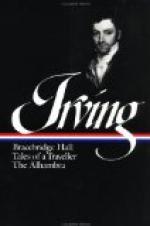A sudden thought struck me how I might extricate myself from his clutches. I was unarmed, it is true, but I was vigorous. His companions were at a distance. By a sudden exertion I might wrest myself from him and spring up the staircase, whither he would not dare to follow me singly. The idea was put in execution as soon as conceived. The ruffian’s throat was bare: with my right hand I seized him by it, just between the mastoides; with my left hand I grasped the arm which held the carbine. The suddenness of my attack took him completely unawares; and the strangling nature of my grasp paralyzed him. He choked and faltered. I felt his hand relaxing its hold, and was on the point of jerking myself away and darting up the staircase before he could recover himself, when I was suddenly seized by some one from behind.
I had to let go my grasp. The bandit, once more released, fell upon me with fury, and gave me several blows with the butt end of his carbine, one of which wounded me severely in the forehead, and covered me with blood. He took advantage of my being stunned to rifle me of my watch and whatever valuables I had about my person.
When I recovered from the effects of the blow, I heard the voice of the chief of the banditti, who exclaimed “Quello e il principe, siamo contente, audiamo!” (It is the prince, enough, let us be off.) The band immediately closed round me and dragged me out of the palace, bearing off the three laborers likewise.
I had no hat on, and the blood was flowing from my wound; I managed to staunch it, however, with my pocket-handkerchief, which I bound round my forehead. The captain of the band conducted me in triumph, supposing me to be the prince. We had gone some distance before he learnt his mistake from one of the laborers. His rage was terrible. It was too late to return to the villa and endeavor to retrieve his error, for by this time the alarm must have been given, and every one in arms. He darted at me a furious look; swore I had deceived him, and caused him to miss his fortune; and told me to prepare for death. The rest of the robbers were equally furious. I saw their hands upon their poinards; and I knew that death was seldom an empty menace with these ruffians.
The laborers saw the peril into which their information had betrayed me, and eagerly assured the captain that I was a man for whom the prince would pay a great ransom. This produced a pause. For my part, I cannot say that I had been much dismayed by their menaces. I mean not to make any boast of courage; but I have been so schooled to hardship during the late revolutions, and have beheld death around me in so many perilous and disastrous scenes that I have become, in some measure callous to its terrors. The frequent hazard of life makes a man at length as reckless of it as a gambler of his money. To their threat of death, I replied: “That the sooner it was executed, the better.” This reply seemed to astonish the captain, and the prospect of ransom held out by the laborers, had, no doubt, a still greater effect on him. He considered for a moment; assumed a calmer manner, and made a sign to his companions, who had remained waiting for my death warrant. “Forward,” said he, “we will see about this matter by and bye.”




